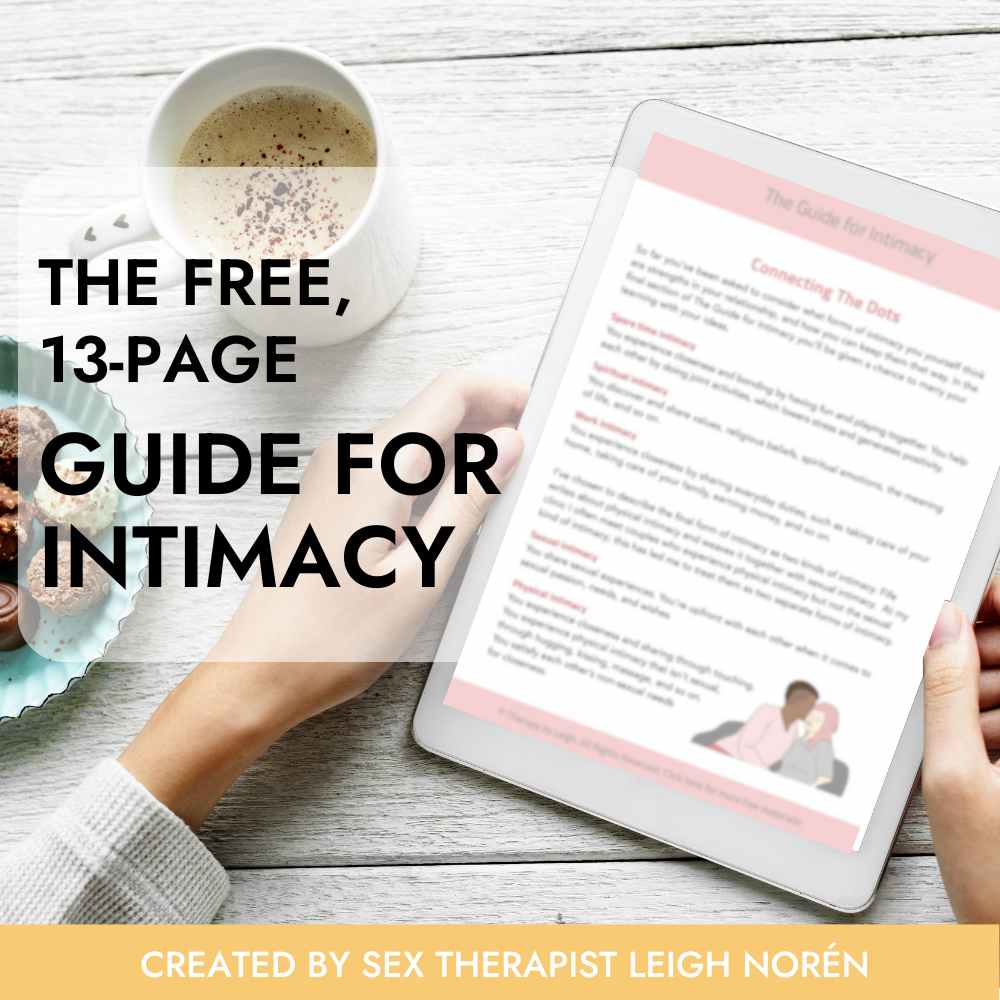10 minute read
Almost everyone gets embarrassed after sex at some point. But this doesn’t mean getting over awkward sex with your partner is easy – by any means.
In this article I share how to overcome an awkward encounter and feel comfortable again, based on my extensive experience as a sex therapist and intimacy coach.
Because if there’s one thing I’ve learned in all my years of practising – it’s that nothing is ever a constant. If you want change, you can create it. All you need is to know why something’s happening and how to move forward.
What is awkward sex & why do you feel embarrassed after sex?
When it comes to embarrassing sex, there are usually several components in the mix. And lots of reasons why you might want to pull the covers over your head after a less-than-passionate encounter.
Strange noises
Whether they come from your mouth or your genitals – unexpected noises can make us feel awkward.
Part of why they feel so embarrassing is because they’re not the kind of sounds you’re expecting to hear (or that you find sexy).
Let’s face it, media doesn’t exactly depict the occasional queef, fart, or breaking voice as a normal part of a hot and heavy encounter. So when we hear it, we inevitably feel that blanket of shame enveloping us.
But as a sex therapist, I want you to know strange, unexpected noises happen during sex to everyone. Yes even for that annoying couple who always seems to be having amazing sex(!).
Trying to stay in control of strange noises will make it hard for you to get out of your head during sex – and into your body (the place where pleasure and arousal resides). And you need to be present in order for sex to feel good.
Losing your erection or not getting wet
When you can’t get hard or lose your erection midway through sex it can feel disheartening. The same goes for struggling with lubrication.
For a lot of people – physical arousal is seen as the receipt proving how attractive your partner finds you. This means, even if you may know your lack of erection has everything to do with anxiety or nerves and nothing to do with them – your partner may not. And so awkwardness ensues, leaving you both at a loss as to what to do.
The thing is though, erections and lubrication aren’t as reliable as we want them to be. Even if you’re really turned on. And they don’t necessarily mean you’re not mentally turned on.
Struggling to orgasm
Orgasms – powerful and pleasurable – but when they don’t occur, it can lead to crickets in the bedroom. But let’s be clear here, a lot of people struggle to come, for various reasons.
It’s the significance we place on orgasms; as a measure of pleasure, as a sign our partner is a “good lover”, as a sign we’re “normal” (whatever that truly means!), that can turn difficulty orgasming into awkward sex.
This leads a lot of people to fake orgasms with their partner. But while this may be a temporary fix for not having to feel embarrassed after sex (and 100% understandable!), it’s unfortunately not a long-term one. At least not one that will help you reach your next orgasm.
When you’re out of sync
There’s a lot happening during sex; hearts pounding, bodies sweating, a melding of desires (and possibly hearts). But in the midst of trying to get all of this to work together, you might just find you’re completely out of sync with one another.
Maybe one of you wants to penetrate fast while the other prefers a slow, sensual approach. Perhaps your partner enjoys making out for 20 minutes while you honestly don’t even like kissing that much.
Whenever you’re out of sync, whether it be in terms of rhythm or sexual preferences, it’s easy for sex to feel really tense.
Haven’t had sex in a long time
When you and your partner haven’t had sex in a long time, the first few times after a dry spell are likely to be a little awkward. Why? Firstly, anything we haven’t done in a long while makes us feel a little rusty.
Secondly, we’re often contending with a lot of worries. Perhaps we’re worried about our performance, if we’re still attractive or if we’re going to enjoy it.
When we’re focused on those potential fears and errors, it makes it hard to be there in the moment.
When we’re not in the moment – we’re not turned on. And when you’re not turned on, that very thing you’re worried about (it being awkward), is, unfortunately, much more likely to happen.
Don’t know how to talk about sex
Awkward sex also has its roots in a lack of communication about sex (or talking about it in the wrong way).
But while great sex doesn’t have to involve any verbal communication, we also know that couples that talk about sex have better sex.
It’s just the way it is.
Because couples that talk about sex grow together sexually.
If you never talk about sex how can you know what your partner wants?
That they’ve stopped liking that thing they loved 4 years ago?
That they actually feel stressed out about that one sexual practice?
That they enjoy when you grab their bum but only after you’ve been having sex for a few minutes, otherwise it feels degrading?
My point is – a lack of communication means there’s so much that’s unknown. And with the unknown, it’s harder to be free in bed and really explore together. With this worry, unease settles in, meaning sex can feel embarrassing.
Insecure about your body
Desire and arousal thrive on presence during sex. And one thing that more often than not makes this near impossible – is feeling insecure about our bodies.
If you don’t feel attractive, chances are that you’ll find it hard to be relaxed during sex. When you’re not relaxed, you feel tense, and tenseness usually makes it harder to sink into pleasure.
You’re also likely to be analysing yourself during sex. Perhaps trying to control what you look like in certain positions, on the lookout for looks of disgust from your partner.
It goes without saying that not only is this anxiety-producing, but it’s also going to create embarrassing sex. Or embarrassment after sex, because now they “know what you look like”.
Sex makes you feel shame or embarrassment
A lot of my clients feel some level of embarrassment or shame surrounding sex. This isn’t strange – on the contrary – with so many negative messages about sex around, it’s no wonder so many of us feel like we want the ground to swallow us whole.
Whether it be religion, sex ed (or abstinence ed) in school, the way your parents frowned when you explored your body as a child, or the way your old partner made you feel in bed – shame that’s once created has a way of etching its way into our bones.
Shame is a powerful emotion, and if there’s any hint of it in connection with sex – it can easily turn a sexy moment into one that’s fraught with worries, anxieties, fears, and awkwardness.
DO YOU WANT TO GET CLOSER TO YOUR PARTNER?

My free resource The Guide for Intimacy gives you access to tools that help you increase the shared intimacy in your relationship – with or without sex.
Download the 13-page guide and you also get access to my deeply appreciated, weekly newsletter. You can unsubscribe at any time.
How to move past an awkward sex encounter with your partner
So, if there are so many reasons why we might feel embarrassed after sex – how do we curb it?
When we start to dig deep and understand why the awkwardness is ensuing, it can sometimes feel impossible to stop.
But this isn’t true. There’s lots you can do to move past the awkwardness once you’ve had a less-than-stellar experience.
Talk about sex like this
The first step is to talk about it with your partner. I know, I know – pretty obvious, right? But I’ll bet you what’s not obvious is how to talk about it and what to say.
There’s no one-size-fits-all conversation here, rather it’s about finding what works for you. Below are two different approaches and how and why they might work for you.
The laid-back approach
For some, it’s about simply acknowledging it was awkward and then laughing about it together, followed by laying in each other’s arms in bed and binging your favourite show.
In the above example, you’re:
- Breaking the ice and reducing the anxiety and shame by acknowledging what just happened
- You’re laughing which releases feel-good-hormones, further decreasing anxiety, and creating feelings of unity
- You’re then giving both of you a chance to feel comfortable with one another and close emotionally by spending time together.
This means you’re likely to feel less awkward the next time you have sex as you’ll know you can get through it should it happen again, and it’s not so serious and doesn’t mean anything negative about your relationship.
Essentially, awkward sex doesn’t turn into a big deal.
The analytical approach
For others, it’s about sitting down and having more of a heart-to-heart. Really going into detail about what felt awkward and what you’d like to change next time. Perhaps even being comforted by your partner while you have a quick cry, or being reminded of how good you are together despite this awkward bump.
In the above example, you’re:
- Communicating openly and honestly about your sexual experience so you can make sure sex is better next time
- Releasing tension and awkwardness by acknowledging what happened and why
- Boosting closeness and love by being comforted or comforting your partner. You’re also validating one another and your relationship as a whole which will make you feel stronger together as a couple.
- You’re also creating an environment in your relationship that fosters more open communication overall.
When you take this approach, just as with the more laid-back approach, you’re allowing yourselves to have better sex next time.
By taking your sexual experience seriously and how you’d like it to be next time, you’re showing yourself and your partner you care and that you’re in this together as a team.
Because once you can talk about sex in all its (potential) awkwardness – there’s not much you can’t talk about.
You’re also cementing your relationship and your love for one another through validation, and letting your emotions of embarrassment and awkwardness truly run their course.
Work through your thought patterns and beliefs
Getting over awkward sex isn’t just about talking about it – it’s also about working through your beliefs.
Whether sex gets awkward because feeling turned on is fundamentally shameful for you, or you feel embarrassed after sex because you made a strange noise – you’re still going to need to work through thought patterns.
You see, how we think about something has a large impact on how we feel about it. It also can create future problems, as our beliefs fundamentally affect what we do and how.
This doesn’t mean you should “think positively” and it will all work out.
If that were the case then we would all be rid of our problems by now, right?
Rather, by getting professional online sex coaching or sex therapy you can work through thought patterns and beliefs and change them, or change how they impact you.
Once you do this work, chances are you’ll feel completely differently about sex, and will be less likely to have awkward sex.
Have more awkward sex
This probably sounds counterintuitive – but hear me out. Sex that’s awkward doesn’t stop being awkward if you go long periods without it. Just like any skill, behaviour or hobby that we haven’t done in a while, the more we do it the easier it becomes.
So even if you’re feeling embarrassed and would rather avoid sex to not have to feel uncomfortable – getting “back on the horse again” is actually part of how sex will stop feeling awkward.
The less we do it, the more we avoid sex; the greater the risk that it will feel supremely awkward next time.
Getting over not-so-great sex
While awkward sex can make you want to die a little inside – it’s not the end and you can overcome it.
By learning how to talk about sex, working on how you relate to sex through addressing thoughts, and by having more of it – sex can actually feel sexy again. Free again. Fun again.
If you want expert help on having more and better sex, my online course Re:Desire will help you do just that.
This 9-month, sex-therapist-created course helps those with low desire have pressure-free, shame-free, awkwardness-free sex with their partner. Check out the free training all about the 4 ways you can start to get your sex drive back today (and have really great sex), and the Re:Desire course, here.


 Anal Beads
Anal Beads Anal Vibrators
Anal Vibrators Butt Plugs
Butt Plugs Prostate Massagers
Prostate Massagers
 Alien Dildos
Alien Dildos Realistic Dildos
Realistic Dildos
 Kegel Exercisers & Balls
Kegel Exercisers & Balls Classic Vibrating Eggs
Classic Vibrating Eggs Remote Vibrating Eggs
Remote Vibrating Eggs Vibrating Bullets
Vibrating Bullets
 Bullet Vibrators
Bullet Vibrators Classic Vibrators
Classic Vibrators Clitoral Vibrators
Clitoral Vibrators G-Spot Vibrators
G-Spot Vibrators Massage Wand Vibrators
Massage Wand Vibrators Rabbit Vibrators
Rabbit Vibrators Remote Vibrators
Remote Vibrators
 Pocket Stroker & Pussy Masturbators
Pocket Stroker & Pussy Masturbators Vibrating Masturbators
Vibrating Masturbators
 Cock Rings
Cock Rings Penis Pumps
Penis Pumps
 Wearable Vibrators
Wearable Vibrators Blindfolds, Masks & Gags
Blindfolds, Masks & Gags Bondage Kits
Bondage Kits Bondage Wear & Fetish Clothing
Bondage Wear & Fetish Clothing Restraints & Handcuffs
Restraints & Handcuffs Sex Swings
Sex Swings Ticklers, Paddles & Whips
Ticklers, Paddles & Whips




















